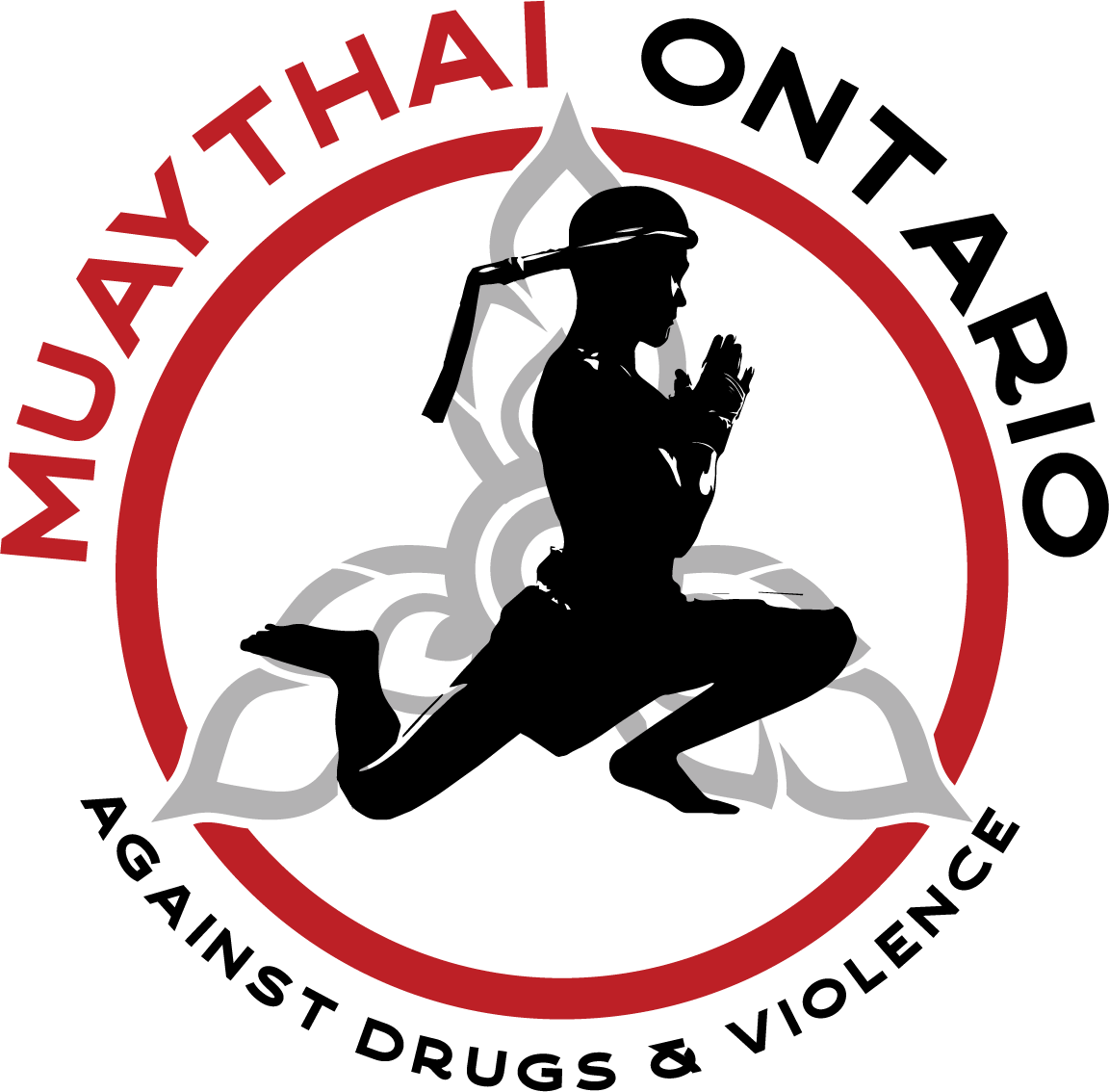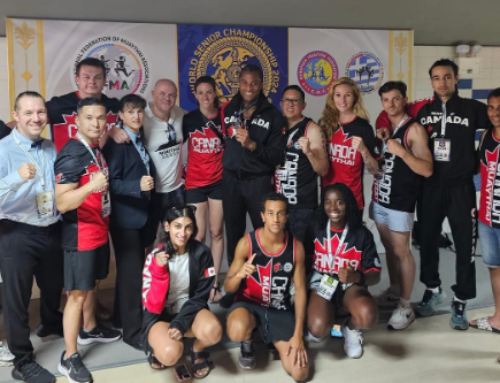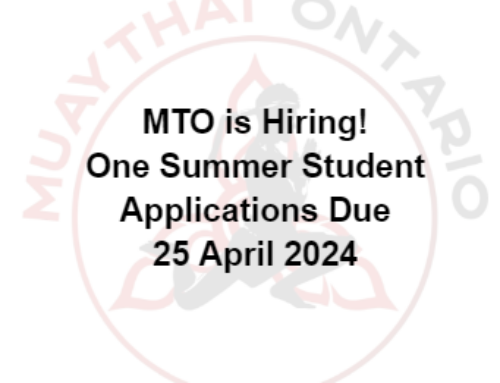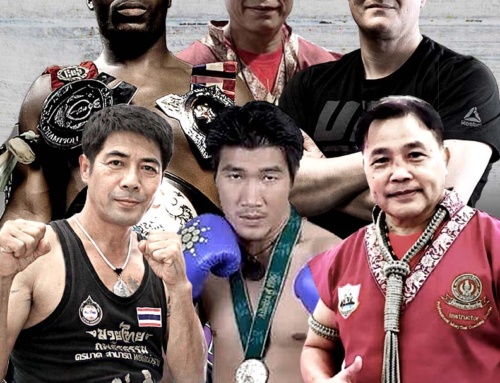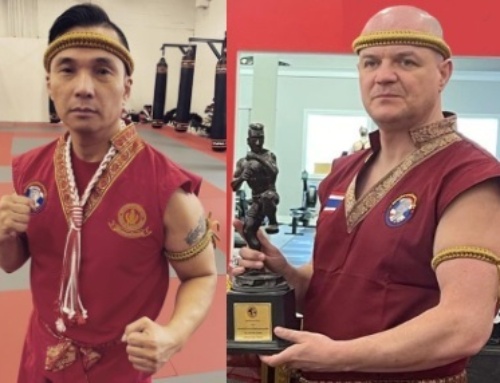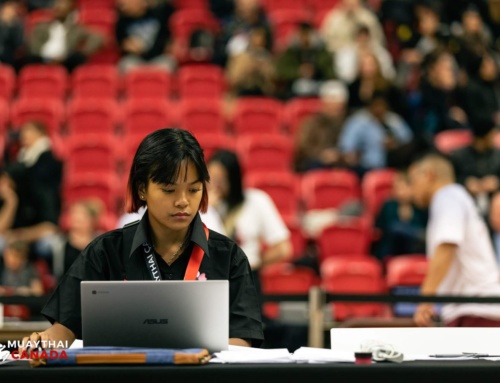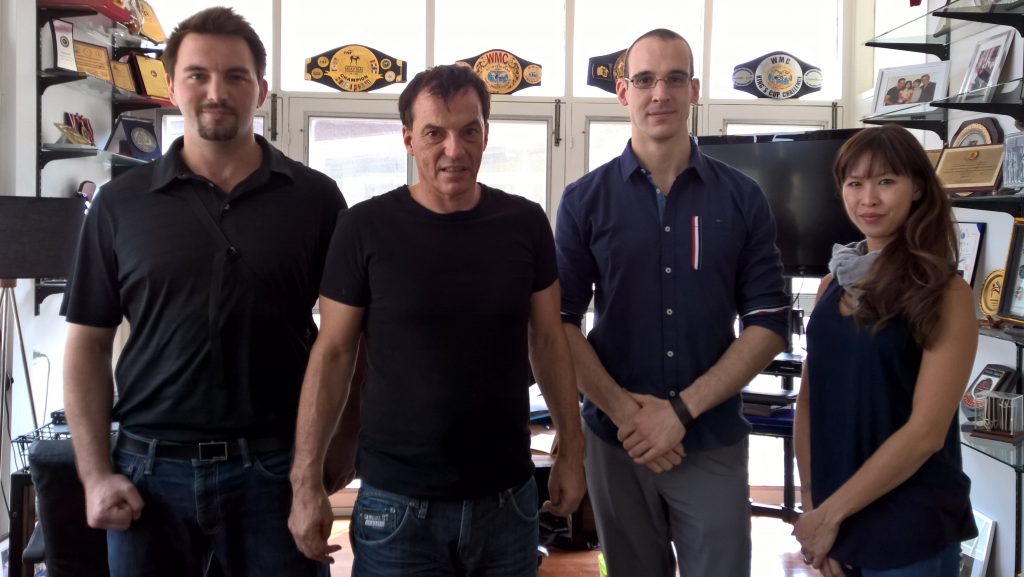
Blog post by Michael Reid
The International Federation of Muaythai Amateur (IFMA) offices have been busy as of late, hosting Canadian visitors from myself to Gabriel Rossi and Janice Lyn. What struck me about my visit was how similar the challenges that IFMA faces are to those faced by Muaythai Canada and Muay Thai Ontario, just on a different scale. In Canada, the major gatekeepers to Muaythai’s growth and recognition are the Federal and Provincial governments; for IFMA, this gatekeeper is the International Olympic Committee (IOC). Just as MTC & MTO work to fulfill the requirements of the Canadian amateur sport framework while at the same time serving the needs of our membership, so too does IFMA put in countless hours working with the IOC and the worldwide National Federations.
Another recent visitor to IFMA was American fighter Sylvie von Duuglas-Ittu of 8limbs.us, a Muaythai blog that takes a much deeper, cultural look at the sport than most other outlets. Following her visit, Sylvie wrote about how sitting down with Stephan Fox, the General Secretary of IFMA and Vice-President of the World Muaythai Council, for an hour changed her outlook on IFMA and amateur Muaythai. In Sylvie’s articulation of the goals IFMA pursues along with the challenges they face, she inadvertently gave voice to the goals and challenges I’ve experienced with amateur Muaythai in Canada. Give her blog post a read, as I’ll be quoting it here to use as a jumping off point to explain my own thoughts:
For a man and a team that has been working for two decades to [get Muaythai accepted in to the Olympics], the frame in which he speaks is in years. You think of a goal, a mission, a “next step” and it’s in a matter of years, not weeks or months. There’s no instant gratification in what they’re aiming to do.
This perfectly encapsulates the feeling I have towards the work that’s being done with Muay Thai Ontario. The organization is in it for the long haul, and planning, decisions and actions are made with an eye to the future; generations to come must be able to benefit from the foundation and structure laid today, and be able to inherit the organization as it is passed along. On top of that, Muay Thai Ontario works closely with the provincial government, and governments aren’t known for working at a brisk pace. Working properly within the confines of the Canadian amateur sport framework can mean additional overhead, delays and changes to meet the requirements set out by government bodies and athletic commissions. Even then government regulations change, such as the Federal Government’s Bill S-209 effectively outlawing all non-Olympic combative sports competition across Canada, leaving it to provinces to make specific exemptions. Keeping up this level of effort when there isn’t immediate payback can be difficult at times, especially when there appear to be easier paths to take, but the greater benefit from building properly makes the tougher path worth it.
When the subject comes up about changing scoring, creating “ranks” within a singular Muaythai “system,” and the inevitable changes to the sport that come from its integration into the Olympics, I admit that I’ve had strong resistance to a lot of it. That said, by sitting and listening to Mr. Fox describe his mission, all the work they’ve already done and where they’re going, I can see how huge and global this mission and these changes really are. I’ve never felt so inspired by the idea of Muaythai making it to the Olympics.
Muaythai is an old sport and resistance to change will always be present, especially when that change feels more restrictive in the short term; the short term and long term don’t always reconcile with each other. Muaythai in Canada and North America has been compared to the Wild West, with different organizations implementing different rules and regulations, each with different goals in mind. Over time, athletes, coaches, clubs and officials have become used to those rules and are hesitant to depart from them even for the long term good of the sport. Just as IFMA has faced in countries worldwide, Muaythai Canada will face unique challenges in each province; some have approved amateur Muaythai competition, others have even made professional competition available; some provinces regulate through athletic commissions, others allow a free for all. Throughout all this, there is no denying the immense amount of good that can come from a unified system of competition from the novice athlete all the way up to the to the elite contender on the international stage.
There are parts of amateur and international Muaythai that don’t appeal to me, mainly that there has to be amendments to scoring and performance in order to set it on the global/international stage… But that doesn’t mean it will change the professional Muaythai of Thailand, or even of Europe or the UAE or North America.
And this is an important distinction to make: amateur and professional Muaythai are not the same, just as amateur and professional Western Boxing are not the same. Amateur and professional rule sets have different objectives in competition for a reason; amateur combative sport rules centre around the safety of the athletic and longevity of their competitive careers. This is a challenge that amateur Muaythai faces: many people want to treat it the same as professional Muaythai because this is what most practitioners are familiar with. As a result, some competitions are amateur in name and earnings only; huge weight cuts and minimal equipment are the norm, athletes are encouraged to leave everything in the ring and knock out their opponent or get knocked out, and safety becomes a secondary concern. While all of this makes for exciting Muaythai, it doesn’t fit with how amateur sports (especially combative sports) are treated in Canada. Ultimately the changes that are made to amateur sports do not come at the detriment of professional sports; a well-developed amateur system provides a constant supply of athletes who, once they have built up enough experience, make the transition from amateur to professional competition.
Muaythai in Thailand is dying… Simply put, the art and the popularity are deteriorating. As long as there’s money in a sport, it will go on… But for money there must be competition and that’s the method by which IFMA is accomplishing incredible things, on a global scale. To bring forth a program that will mean every school child in Thailand will learn some Muaythai also means a preservation of the art, the heritage, and the identity of Muay across the board. That’s huge.
Competition and money are vital for a sport to flourish, but accessibility is another key factor. For example there is plenty of money in MMA, yet Patrick Cote explained the difficulties that MMA is facing in Canada without having any serious organization to build the next generation. It’s no secret that in North America, Muaythai’s general popularity rides on the coattails of MMA. There are very few organizations actively looking to build and sustain the popularity, improve the accessibility, and grow the sport of Muaythai in North America. IFMA’s efforts represent one of the most promising initiatives for widespread Muaythai adoption by making it more accessible to youth around the world. It’s not just competition, but the right kind of competition.
Through the process of endless paperwork and bureaucracy that is required for getting Muaythai into the Olympics, an incredible number of unarguably wonderful things also open up: programs for kids, UN campaigns that work against violence against women and children, a curriculum to be introduced to every single school child in Thailand.
And this is what the right kind of competition with the right organization can bring. The programs and services that come along with amateur sports are just as important as the ability for an athlete to demonstrate their skill and training in the ring. The after-school programs, the weekend camps, the charity drives, the community events…all of which are important for the popularity and preservation of a sport.
When I started working with Muay Thai Ontario, my immediate thoughts were focused on enabling Muaythai competition in a province that was starved for it. It didn’t take long after familiarizing myself with the Canadian amateur sport framework to see that Muaythai was lacking far more than competition; the deficit in support that Muaythai has in comparison to other sports is staggering, and by filling that gap the benefits that can be provided for our athletes is immense.
So, I absolutely see now what the vision is and what the IFMA is attempting to do…
And I hope Canada does as well.

